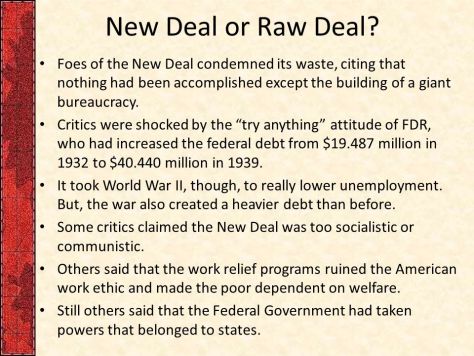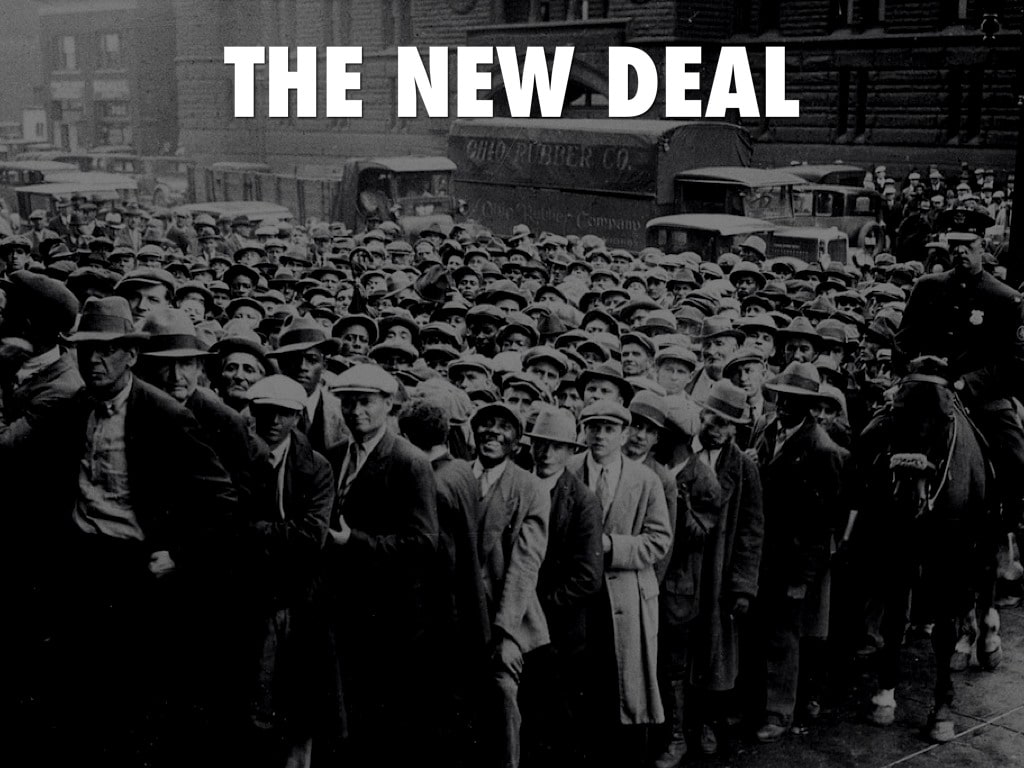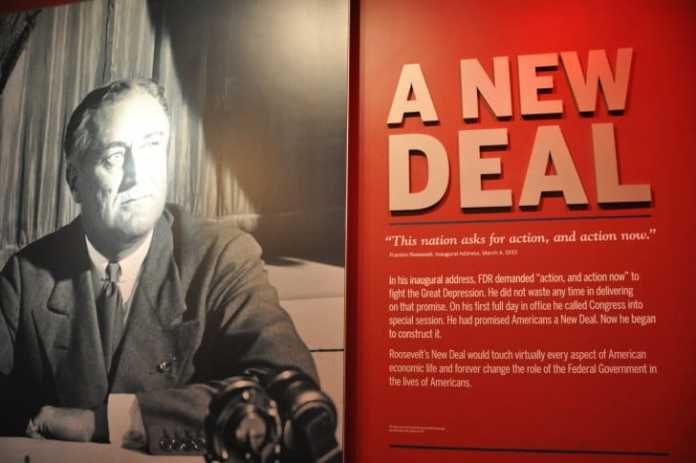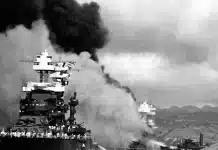The conventional version of the New Deal contends it rescued the country from the Great Depression. Those who expound this viewpoint treat Franklin Delano Roosevelt as the savior of the country.
These same disciples of the expansive bureaucratic government have never looked back. For them, their article of faith is based upon the supremacy of executive authority. This viewpoint is content to abandon the foundational roots of the Republic and is particularly eager to accept a centralized and governed economic system.
The adverse consequences of this departure from the land of the free are routinely ignored since the proponents of the cradle to grave society must adhere to the myth that government is indispensable in every aspect of our lives.
Jacob G. Hornberger the founder of the Future of Freedom Foundation writes in The Socialism and Fascism of the New Deal. “In the ongoing debate over Franklin Roosevelt’s New Deal, there are important things that pro-New Dealers would prefer not be mentioned, such as the similarities between Roosevelt’s philosophy and programs and those of Mussolini, Stalin, and Hitler.” Mr. Hornberger continues:
“The New Deal succeeded in permanently establishing an entirely new economic system in America, one we commonly refer to today as the welfare state and the regulated economy.
Roosevelt’s system was based on using the force of government to take money from people in order to give it to other people. That’s what Social Security was all about. It was also based on the power of government to control and regulate the economic activities of the people. That’s what the SEC was all about.”

A concise summary by Larry Gates of the actual negative aspects of the New Deal follows.
“One of the major negatives of the New Deal was that it upset the balanced Federal budget and created a huge deficit for the nation while at the same time failed to end massive unemployment. Roosevelt’s program, based on Keynesian theories of economics, called for massive government spending to stimulate the economy.
Roosevelt obviously could not do this with large tax increases; so instead large sums of money were borrowed to fund New Deal programs. When the economy did show some improvement, Roosevelt worried about inflation, and ordered cuts in government spending.
Unfortunately, he did so at a time when the new Social Security tax had cut people’s disposable income. Businesses were too scared to spend, and the economy in 1937 was in worse shape than in 1929. At the end of that year, two million people were out of work. Roosevelt eventually reinstituted government spending, but it was too little too late. Employment levels did not reach those which had existed prior to 1929 until the outbreak of World War II.
So, although the New Deal gave people hope, its program of Relief, Recovery and Reform did little to end the Great Depression other than push the country into more debt.”
In order to fully appreciate the radical betrayal of the financial stability of the treasury, review the path to bankruptcy and National Debt by Year Compared to GDP and Major Events. The New Deal initiated the political acceptance that governmental spending was necessary to keep the economy going. This fiduciary heresy is at the core of the deficit spending that has beleaguered succeeding administrations.
The impact from the installation of the private Federal Reserve debt creation central banking system adds the fuel to the flames of government’s uninterrupted escalation. FDR put into motion the public/private partnership economy which plagues all collectivist regimes. While this is certainly bad enough, his appetite to push the United States into another world conflict is evident by the historic record.
David Boaz cites the analysis of Wolfgang Schivelbusch’s book, Three New Deals: Reflections on Roosevelt’s America, Mussolini’s Italy, and Hitler’s Germany in his article Hitler, Mussolini, Roosevelt. ”
Schivelbusch concludes his essay with the liberal journalist John T. Flynn’s warning, in 1944, that state power feeds on crises and enemies. Since then we have been warned about many crises and many enemies, and we have come to accept a more powerful and more intrusive state than existed before the ’30s.”
In a different essay from the Foundation for Economic Education on Schivelbusch, the comparison continues.
“What Schivelbusch brings out is the change in the role and conception of political leadership. Gone was the notion that those in political office were executors of constitutionally limited responsibilities. Now the “leader” spoke and led outside the ordinary restraints of the political process. Both Hitler and Roosevelt appealed to “the people” directly, with the claim that unusual circumstances required extraordinary authority.
Military power was an essential imagery in the rhetoric. Hitler glorified uniformed legions in torch-lit parades. Roosevelt emphasized military imagery in his speeches, such as his 1933 inaugural address, in which he spoke of the Depression as if it were a foreign foe.
If Americans did not voluntarily comply with his proposed recovery programs, he would not hesitate to use the full coercive powers of the state to win the “war” against unemployment. He spoke of the Blue Eagle, the symbol of the NRA, as a badge that all patriotic businesses should proudly display to prove they were doing their part and to distinguish them from “enemies” of recovery who refused to go along with the government’s plans.”
In a third article from the FEE, Burton W. Folsom argues in If FDR’s New Deal Didn’t End the Depression, Then It Was World War II that Did.
“FDR had halted many of his New Deal programs during the war—and he allowed Congress to kill the WPA, the CCC, the NYA, and others—because winning the war came first. In 1944, however, as it became apparent that the Allies would prevail, he and his New Dealers prepared the country for his New Deal revival by promising a second bill of rights.

Included in the President’s package of new entitlements was the right to “adequate medical care,” a “decent home,” and a “useful and remunerative job.” These rights (unlike free speech and freedom of religion) imposed obligations on other Americans to pay taxes for eyeglasses, “decent” houses, and “useful” jobs, but FDR believed his second bill of rights was an advance in thinking from what the Founders had conceived.”
The Old Right as represented by the wisdom of John T. Flynn offers the definite critical condemnation of Franklin D. Roosevelt in his book The Roosevelt Myth. Insightful objections to Roosevelt’s dictatorial and subversion of the U.S. Constitution are evident in the Ralph Raico article that Flynn penned.
“As the battle over intervention intensified, Flynn observed that Roosevelt was wrecking the constitutional balance in foreign affairs as he had domestically. When the president sent troops to occupy Iceland in July, 1941, Flynn assailed the unconstitutional act and the supine Congress that permitted it: Roosevelt “could not do this if the Congress of the United States had not been reduced to the state of a servile shadow” of what the Founders intended.
In the “Four Freedoms” declaration issued by Roosevelt and Churchill, in August, 1941, Flynn saw prefigured the globalist program for America: “the task is forever to be ours of policing the world, inflicting our ideologies and our wishes upon the world.”
This example of FDR’s belligerent desires has nothing to do with defending our country, but has everything to do with spawning a world empire. Since the miserable appearance of a slow economic recovery during the New Deal could no longer be concealed, the Roosevelt Brain Trust understood a major military involvement was necessary to jump start full employment.
Adding to the national indebtedness came just as easy as allowing the Japanese to strike Pearl Harbor. Secretary of War Henry Stimson wrote in his diary: “The question was how we should maneuver them [the Japanese] into the position of firing the first shot….”
Franklin Delano Roosevelt may have been competing with the Axis powers for a global land grab, but the double-dealing President was really fighting the American Nation. Victory was not won by and for the “greatest generation” warriors. The theaters of operations were conquered by the globalists to establish their New World Order.
Full employment which provides a living wage was never the objective. Social welfare subsidies or government make useless work employment has become the norm. Continuous additions to the public debt feed the bankster financial tyranny which requires the war munitions merchants of death to wage their continuous trade.
FDR’s administration literally produced a raw deal for the populace. Liberating the western continent set into motion the conditions for the Fourth Reich known as the European Union. The defeat of Germany set loose the Soviet Communists comrades. Vanquishing Japan gave rise to the Red Chinese. And the Allied triumph installed the globalists under the banner of the United Nations.
Guaranteed world conflict powers the war machines just as much as oil. Thank Roosevelt for the destruction of an America First nation and the birth of the NWO interdependency.
SARTRE – February 27, 2017
- Read the entire article on the “Forbidden History” archives
- Subscription sign-up for the BATR RealPolitik Newsletter
- Discuss or comment about this essay on the BATR Forum
SARTRE is the pen name of James Hall, a reformed, former political operative. This pundit’s formal instruction in History, Philosophy and Political Science served as training for activism, on the staff of several politicians and in many campaigns.
A believer in authentic Public Service, independent business interests were pursued in the private sector. As a small business owner and entrepreneur, several successful ventures expanded opportunities for customers and employees. Speculation in markets, and international business investments, allowed for extensive travel and a world view for commerce. He is retired and lives with his wife in a rural community.
“Populism” best describes the approach to SARTRE’s perspective on Politics. Realities, suggest that American Values can be restored with an appreciation of “Pragmatic Anarchism.” Reforms will require an Existential approach. “Ideas Move the World,” and SARTRE’S intent is to stir the conscience of those who desire to bring back a common sense, moral and traditional value culture for America.
Not seeking fame nor fortune, SARTRE’s only goal is to ask the questions that few will dare … Having refused the invites of an academic career because of the hypocrisy of elite’s, the search for TRUTH is the challenge that is made to all readers. It starts within yourself and is achieved only with your sincere desire to face Reality.
So who is SARTRE? He is really an ordinary man just like you, who invites you to join in on this journey.
Resources: BATR Newsletter
– BATR Forum
All content herein is owned by author exclusively. Expressed opinions are NOT necessarily the views of VNR, authors, affiliates, advertisers, sponsors, partners, technicians, or VT Network. Some content may be satirical in nature.
All images within are full responsibility of the author and NOT VNR.
Read Full Policy Notice - Comment Policy






























